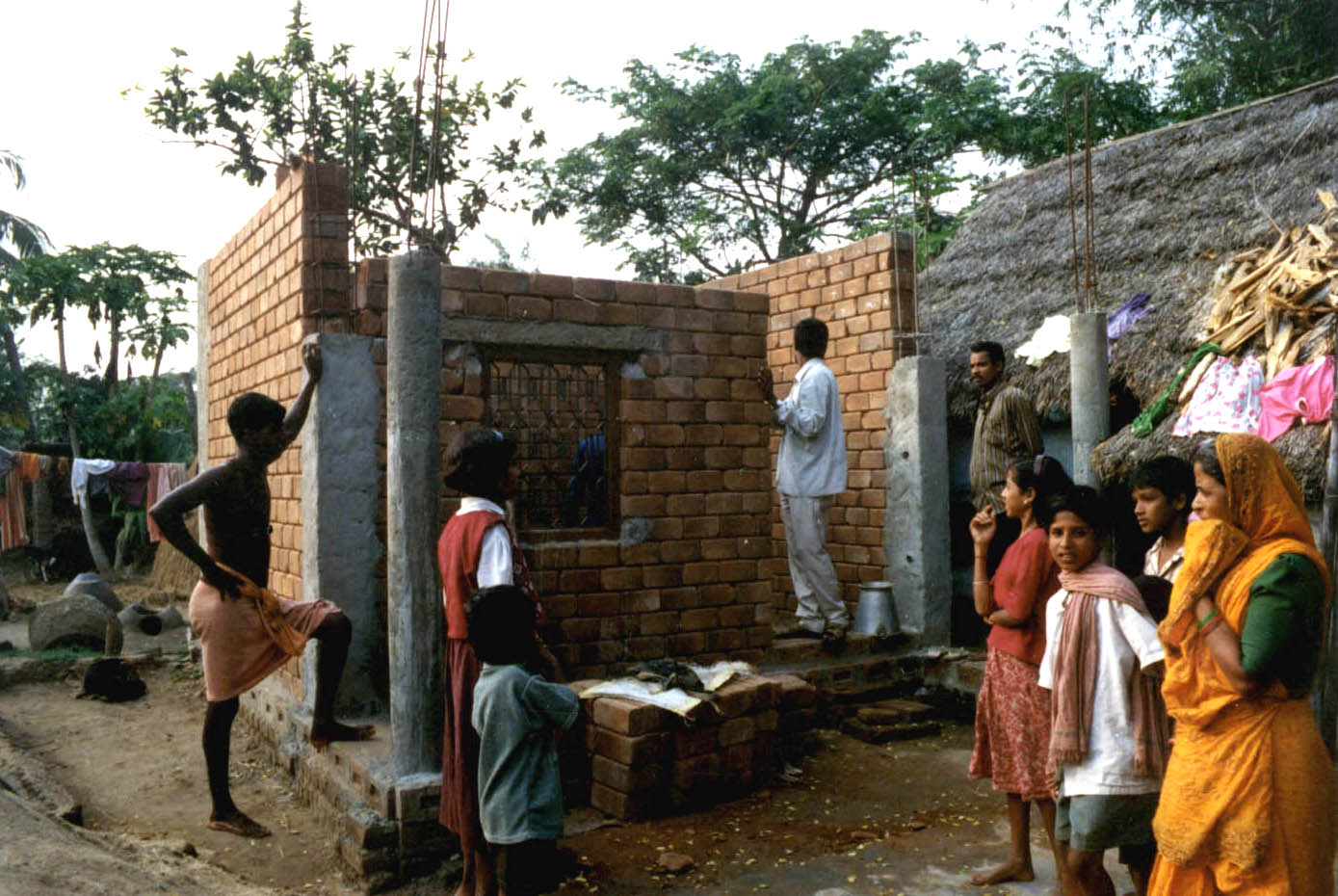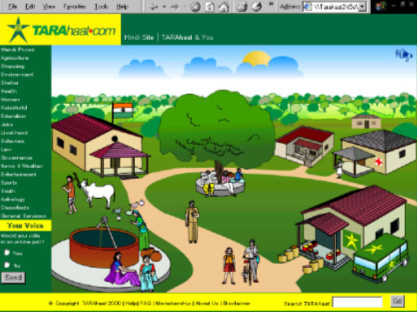|
Sustainable Habitat Services "the TARA Way"
Shrashtant Patara Information and Communication Technologies (ICT) have immense potential as a development tool in promotion of appropriate architecture through the provision of information and related services. Positive impacts achieved in the area of habitat are not only very visible, they also provide immediate and tangible benefits in terms of basic need fulfilment, job creation and the health of our environment. Such impacts can be achieved on a large scale only if people, particularly the poor, make informed choices and have reliable delivery mechanisms for products and services that they can transact with to act upon their choices. In countries such as India, such an expression of demand and its stimulation through supply must expand at a much faster pace than has been witnessed in the past. Perhaps more pertinent and of immediate relevance to development professionals, is the fact that acceleration of local economic activity can take place if critical elements are brought into play through sustainable market creation strategies. In this issue, we focus on “services” that enable people to build better homes and
improve their built environment. More often than not, development programmes that support the creation of service networks focus on the service provider alone. Typically, technological, financial and market related support services are extended to the provider on the assumption that if the provider, normally a micro-entrepreneur (or group enterprise) is made effective and efficient, market penetration will take place. While such supply side supports are necessary, they are clearly not sufficient. The end-user must be addressed. This has, till recently, been a very difficult proposition, primarily on account of the costs of creating awareness and supplying information that would aid decision making. It is our view that major breakthroughs are now possible on this front through the use of Information and Communication Technology (ICT). They have immense potential as an instrument to promote products and services meant for basic need fulfillment. Easy accessibility to information and know-ledge enables people to make informed choices. The need and the ability to do so is even more critical in the case of the poor because they have limited resources at their disposal. When people cross an activation barrier in terms of making choices, they express a demand. Once a demand is generated, growth takes place in the market place driving local economic systems into an upward spiral. So far so good. What then do we think is the key driver in ICT enabled market creation?
Perhaps the most unfortunate aspect of the IT revolution in India is that the industry is focusing almost entirely on technology and what it can do. People, on the other hand, need content. Generation, management and delivery of content is not something that can be done by one organization alone. A network of partners is needed to facilitate accessibility and exchange of information. The challenge in content development is that of data volumes and more importantly that of customization and standardization to different contexts because people build in many ways and they build incrementally. Creation of demand is only half a job done. The absence of fulfillment can drive any market based mechanism to death and the people to despair. What then do we think is the key driver in a reliable delivery mechanism?
It is crucial to link ITC enabled information flows with viable service providers that respond when people make informed ‘sustainable’ habitat choices. It is no point letting someone know that a better roof can be built with MCR tiles if the tiles are not available or suggesting that roofs be insulated with earthen pots if local masons do not know the how and why of doing so. Here again, the capacities of organizations promoting sustainable building practices are grossly inadequate and networking, particularly the engagement of private enterprise, becomes crucial. It is our belief that while the importance of these two components has been understood by many, very few initiatives have been launched in the area of habitat services to build a synergistic relationship between them and bring these services to the real home builders of India. The Development Alternatives Group endeavours to meet both ends of demand generation and supply through its two business affiliates - TARAhaat Information and Marketing Services and TARA Nirman Kendra.
TARAhaat is an internet based initiative that uses the power of IT to bring knowledge, services and products to rural and small town India. It consists of TARAhaat.com, the mother portal, together with franchised networks of local enterprises for connectivity and for delivery of information, goods and services. The cyber cafes or ‘TARA Kendras’, as they are called, are managed and run by independent entrepreneurs and provide a wide variety of information services to the rural populace. Another significant aspect is that of E- education, in which skill development for sustainable building practices can be achieved through short term ‘flexi- module’ courses. The host of allied services at the ‘supply‘ end such as provision of building materials, house designs, artisan training services, etc. are provided by TARA Nirman Kendra. There are two Kendras – at Orchha in Madhya Pradesh and Delhi. They are engaged in the production and application of products such as micro concrete roofing tiles, ferrocement channels, paving blocks, door and window frames, concrete blocks, VSBK bricks etc. The TNK brand “TARAcrete” is widely recognized in the Bundelkhand region and TNK-Orchha now has an operating turnover of over ten million Rupees a year on marketing of products and related services alone. As TARAhaat’s penetration in this region is still limited, TNK also acts as a disseminator of information. But, it is evident that the inherent advantages and cost-effectiveness of ICTs will witness TARAhaat playing a much greater promotional role in the future. TNK will henceforth form a strong back-up for the information service provided by TARAhaat and meet the challenge of closing the information-knowledge-service loop. TARAhaat and TARA Nirman Kendra are business entities and have, until market development takes place, severe limitations in terms of investment for content development. This is where Development Alternatives and its network partners, supported by public funding, play an important role. The Eco-Building Advisory Unit collects, processes, packages and disseminates information. Network linkages being crucial, DA is a member of the “Building Advisory Services Information Network” (BASIN) — an international network of organizations involved in appropriate architecture. BASIN, through its website and knowledge base, brings together diverse project experiences and information in the form of publications, questions and answers and know-how resources in a common pool from which it can be retrieved through the internet. The network also serves to create links between know-how and resources for all those in need of relevant information - government officers, financiers, builders, architects, building material producers, etc. Development Alternatives, which is one of the network partners, also performs the ‘webmaster’ functions of the network. All ICT enabled services must bear in mind the financial viability of the services provided and the dynamism of services with respect to the real needs of people it serves. The various resource nodes established through the information network must remain actively engaged in updating information and ensuring its easy accessibility. The TARA model of information and delivery synthesis is only a prototype of what we believe will be a viable business system capable of making sustainable building solutions accessible, affordable and available to people. It is unlikely that TARAhaat, TNK and other such business entities will achieve viability through the provision of services in this sector alone. Diversity of operations and strategic business partnerships will be crucial for growth and large scale impact. q
|

